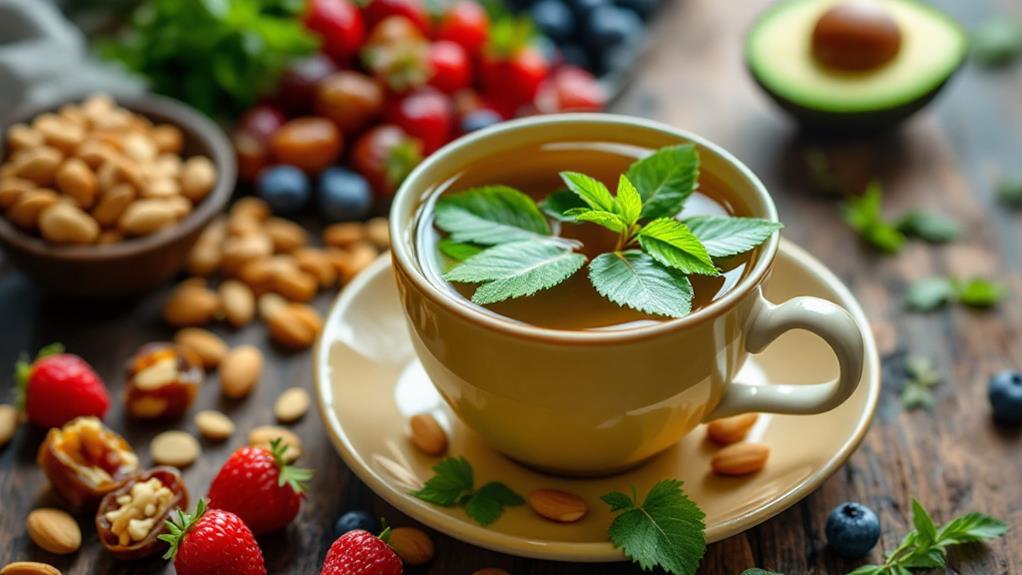Does Consuming Prunes Help With Constipation? The Science Behind It
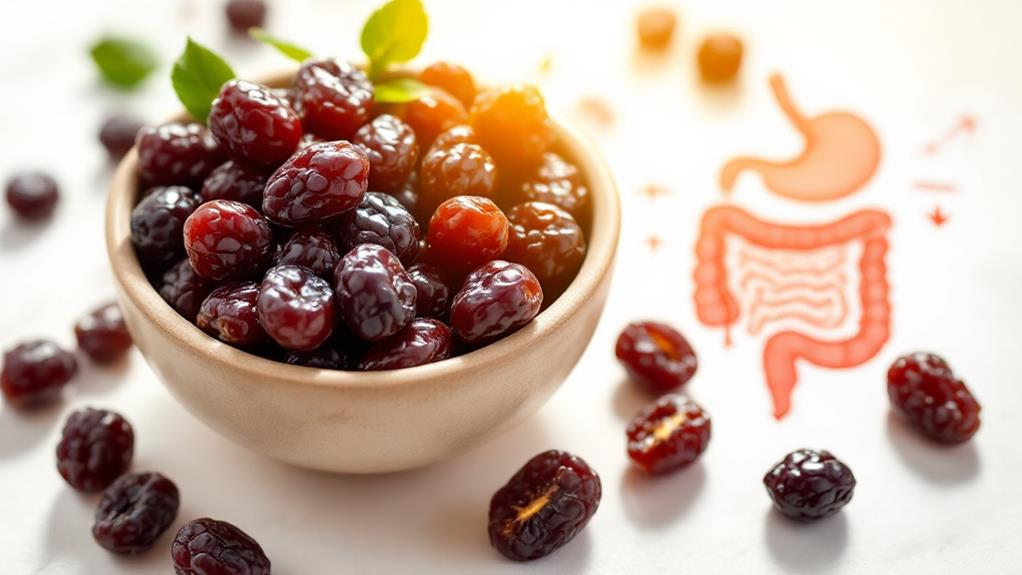
Yes, consuming prunes helps with constipation. They're packed with dietary fiber and sorbitol, a natural sugar alcohol that draws water into your intestines to soften stools and increase bowel movements. Prunes outshine many over-the-counter laxatives, thanks to their unique combination of fiber, sorbitol, and polyphenols. Research shows that eating 100 grams of prunes can greatly improve stool frequency and consistency. They're a natural remedy with added benefits like improved gut health and crucial nutrients. Starting with moderate amounts, especially in children, prevents discomfort. Curious about the other advantages of these tiny fruits? Stick around for enlightening insights.
Prune Composition and Nutrients
Prune juice is primarily composed of water, making up 81% of its content, along with 17% carbohydrates and a small amount of protein at 0.6%. This composition makes it a revitalizing drink with only 71 calories per 100 g. A significant aspect of prune juice is its high dietary fiber content, at 16.4 g per 100 g serving. This fiber, combined with 17.4 g of sugars, plays a vital role in the digestive benefits and general health effects of prunes.
When you consume prune juice, you're not just quenching your thirst but also aiding your digestive system. The presence of sorbitol, a natural sugar alcohol, improves its laxative effect, making it a reliable choice for those experiencing constipation. Prune juice also provides key nutrients like Vitamin B6, with 17% of the Daily Value per 100 g, and minerals such as potassium, calcium, and magnesium.
These nutrients contribute to maintaining general health. Drinking prune juice can help you meet your nutritional needs while promoting bowel regularity. Next time you're considering a natural option for digestive health, remember the potent benefits of prune juice.
Prune Juice Production Process
In producing prune juice, a common method involves cooking dried plums in hot water to extract a rich liquid. This hot extraction process guarantees that the juice you consume is packed with nutrients. As you may know, prunes are fundamentally dried plums, and the process of turning them into juice enhances their beneficial properties. Multiple heating and extraction cycles with the same batch of prunes lead to a more concentrated juice, rich in dietary fiber.
Each batch of prune juice contains at least 18.5% water-soluble solids from the dried plums. These solids contribute considerably to the juice's nutritional value, especially its sugar content and dietary fiber, which are vital for digestive health. If you're dealing with constipation, you might find prune juice helpful, as this dietary fiber can promote regular bowel movements.
Low-temperature extraction methods can yield juice concentrates with even higher sugar content, which are often used in baked goods. However, for addressing constipation, the standard liquid extract of prune juice is what you'll want. With a composition of 81% water and 17% carbohydrates, prune juice offers a hydrating and nutritious option that supports your digestive system.
Dietary Benefits and Uses
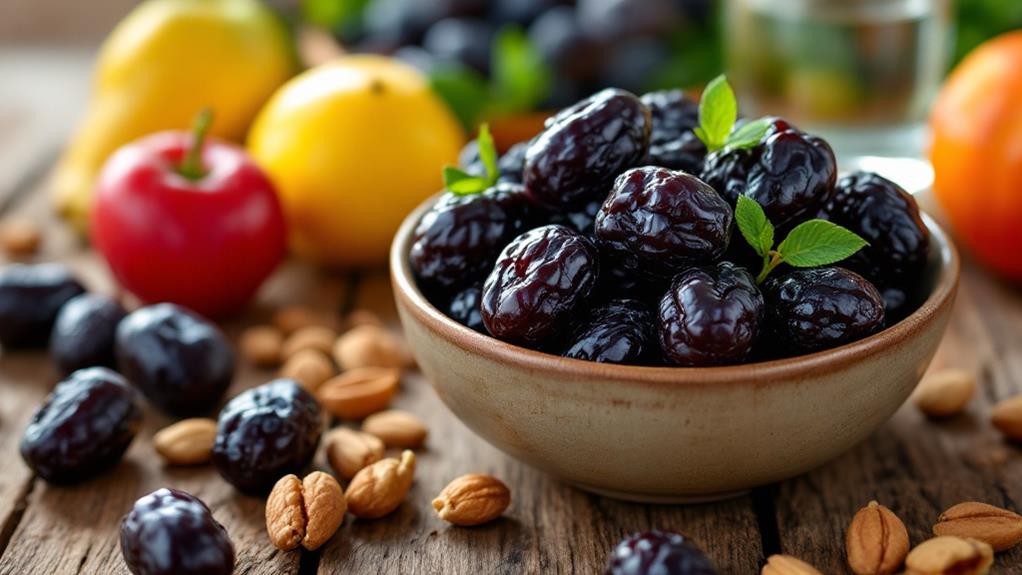
While understanding the production process of prune juice provides insight into its composition, it's the dietary benefits and uses where you'll see its true value. Prunes are packed with dietary fiber, offering 16.4 grams per 100-gram serving. This high fiber content plays a vital role in promoting regular bowel movements, effectively preventing constipation. By including prunes in your diet, you can greatly improve constipation relief and support general digestive health.
The natural sorbitol found in prunes is another significant player. This sugar alcohol draws water into your intestines, softening stools and making them easier to pass. This combination of fiber and sorbitol makes prunes a natural and effective remedy for constipation relief. Regular consumption of prunes not only tackles constipation but also boosts stool frequency. Studies show an increase in bowel movements from 2.8 to 3.5 times per week when consuming 100 grams of prunes daily for three weeks.
Beyond their laxative properties, prunes are rich in polyphenols and potassium, vital nutrients that further bolster digestive health. These components contribute to maintaining a healthy digestive system, ensuring that prunes are more than just a tasty snack—they're a powerful ally in achieving regular bowel health.
Scientific Studies on Prunes
Scientific research provides compelling evidence for the efficacy of prunes in managing constipation. If you're looking for a natural remedy, consider adding 100 grams of prunes to your daily routine. A systematic review from 2014 demonstrated that consuming this amount for three weeks increased bowel movements from 2.8 to 3.5 per week among participants with constipation (P = 0.006). This suggests that prunes can be a reliable option for improving your gastrointestinal health.
Clinical trials have shown that prunes not only improve stool frequency but also boost stool consistency. On the Bristol scale, scores improved from 2.8 to 3.2 when compared to psyllium fiber (P = 0.02). This means prunes may be more effective than some common over-the-counter solutions. The dietary fiber in prunes, along with sorbitol and polyphenols, contributes to their ability to soften stool and increase stool weight. Even if you're not constipated, prunes can positively impact stool weight, as one trial showed an increase from 514 g to 628 g over 72 hours (P = 0.001). So, regardless of whether you're dealing with constipation or just seeking better gastrointestinal health, prunes are worth considering.
Mechanisms of Action
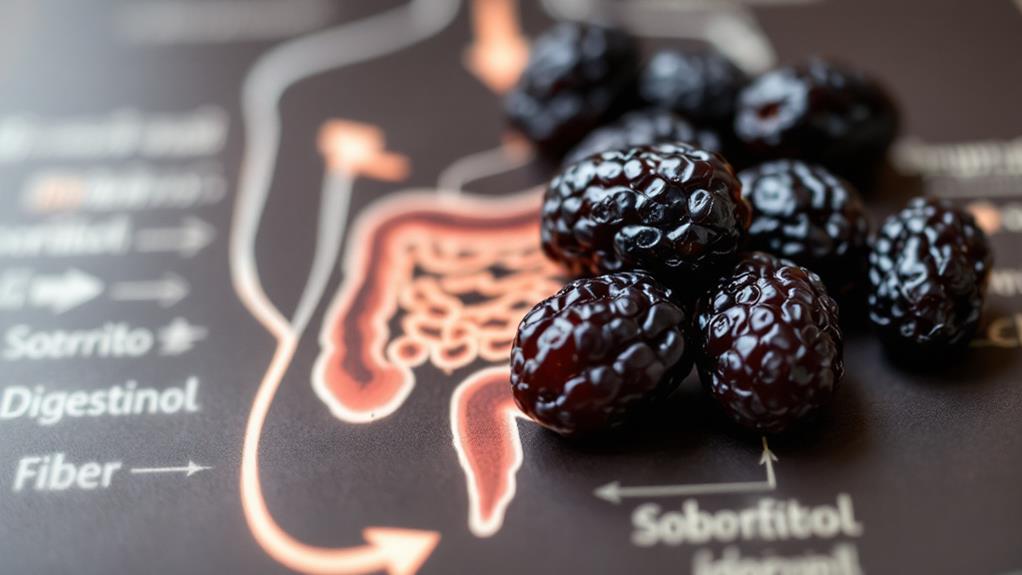
To understand how prunes alleviate constipation, it is essential to investigate their mechanisms of action. At the heart of prunes' effectiveness lies sorbitol, a sugar alcohol found in high levels in prune juice. Sorbitol draws water into your colon, which softens hard stool and promotes easier bowel movements. Then there's the dietary fiber, particularly pectin, which adds bulk to your stool and fosters regularity. This combination guarantees that your gastrointestinal system functions smoothly.
Moreover, prunes are rich in polyphenols, which might improve their laxative effects by influencing the health of your gut microbiome and increasing digestive function. Research even shows that prune juice outperforms psyllium in improving stool frequency and consistency. The synergy between sorbitol, dietary fiber, and polyphenols likely makes prunes a powerful natural remedy for constipation.
Here's how they work:
- Sorbitol: Attracts water into the colon, softening stool.
- Dietary Fiber: Adds bulk and aids in regular bowel movements.
- Polyphenols: Support gut microbiome health, improving digestion.
- Synergistic Effect: Combines sorbitol, fiber, and polyphenols for efficacy.
- Research-Backed: Prunes outperform psyllium in stool improvement.
Understanding these components helps you appreciate how prunes can support your gastrointestinal health.
Prunes vs. Other Remedies
Many people seeking relief from constipation turn to different remedies, but prunes stand out due to their unique composition. They pack a powerful punch against constipation thanks to their high levels of sorbitol, a natural sugar alcohol that draws water into your intestines. This makes prunes more effective than many over-the-counter laxatives. When you consume prunes, you're not just relying on dietary fiber; you're benefiting from the combination of fiber and sorbitol, which work together to soften stools and promote regular bowel movements.
Studies have shown that eating about 100 grams of prunes daily can considerably increase stool frequency and improve stool consistency compared to psyllium, a common fiber supplement. While prune juice offers a similar laxative effect, you'll find that dried prunes contain even more fiber and sorbitol, potentially making them more effective for some people.
Unlike many pharmacological laxatives, which can lead to dependency, prunes provide a natural solution with no considerable side effects reported. They offer a preferable choice if you're looking for a gentle, yet effective remedy for constipation. By incorporating prunes into your diet, you're opting for a natural, reliable approach to maintaining digestive health.
Recommended Consumption Amounts
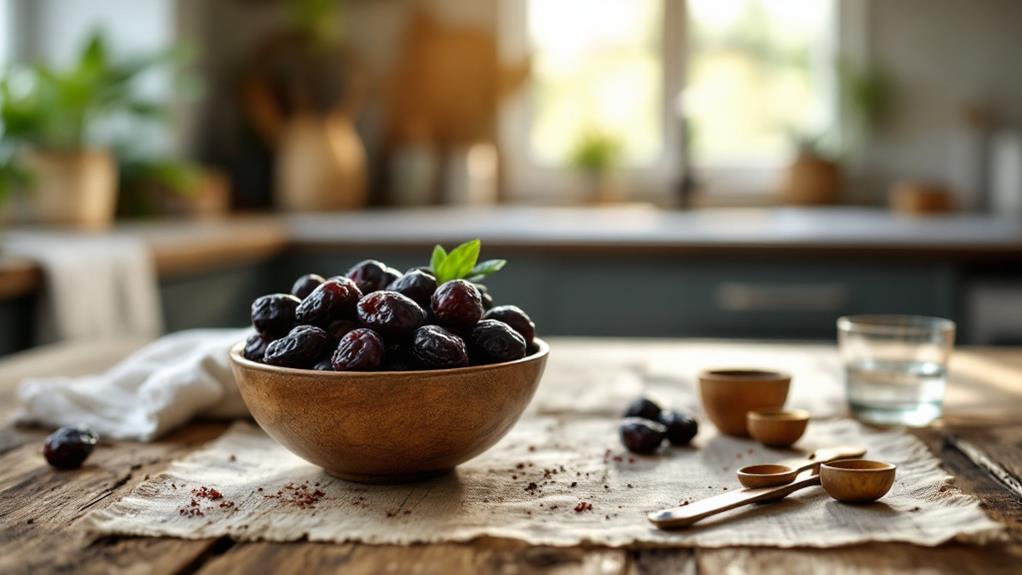
When starting with prunes for constipation relief, it's crucial to contemplate recommended consumption amounts to avoid any unwanted side effects. Prune juice is a popular choice, and knowing just how much to consume can make all the difference in effectively easing constipation. Begin with a conservative approach to find what works best for you.
- Adults: Start with a half-cup (4 ounces) of prune juice. If you find it effective, you might consider a smaller daily serving of 2 ounces to gauge your body's response.
- Incremental Increase: If the initial amount is well-tolerated, you can gradually increase your intake. Some find an extra serving at night improves its effects.
- Children: Use caution and halve the adult recommendation. About 2 ounces is suitable for children to prevent overconsumption.
- Moderation: Always keep moderation in mind. Prune juice is powerful, and excessive amounts can lead to discomfort like diarrhea or bloating.
- Monitor Your Body: Pay attention to how your body reacts. Adjust your intake accordingly to maintain a balance and prevent any adverse effects.
Potential Side Effects
Consuming prune juice can indeed help with constipation, but excessive intake might lead to some unwelcome side effects. You might experience gastrointestinal discomfort, such as bloating, gas, or diarrhea, due to the high sorbitol and fiber content in prunes. To avoid these potential health effects, it's wise to start with a half-cup (4 ounces) of prune juice. Gradually increasing the amount can help your body adjust and minimize discomfort. For children, it's significant to halve this amount to prevent overconsumption and any associated digestive issues.
While prunes are generally safe, some people may experience rare allergic reactions. If you notice symptoms like a rash or severe gastrointestinal distress, it's vital to seek medical advice. These reactions, though uncommon, can sometimes occur and might require a healthcare provider's input, especially if symptoms persist.
For those dealing with chronic constipation, prunes can be a helpful addition to your diet, but moderation is key. If prunes don't seem to alleviate your symptoms or cause significant discomfort, consulting a healthcare provider is fundamental. They can offer guidance tailored to your needs and guarantee that your approach to managing constipation is both safe and effective.
Additional Health Benefits
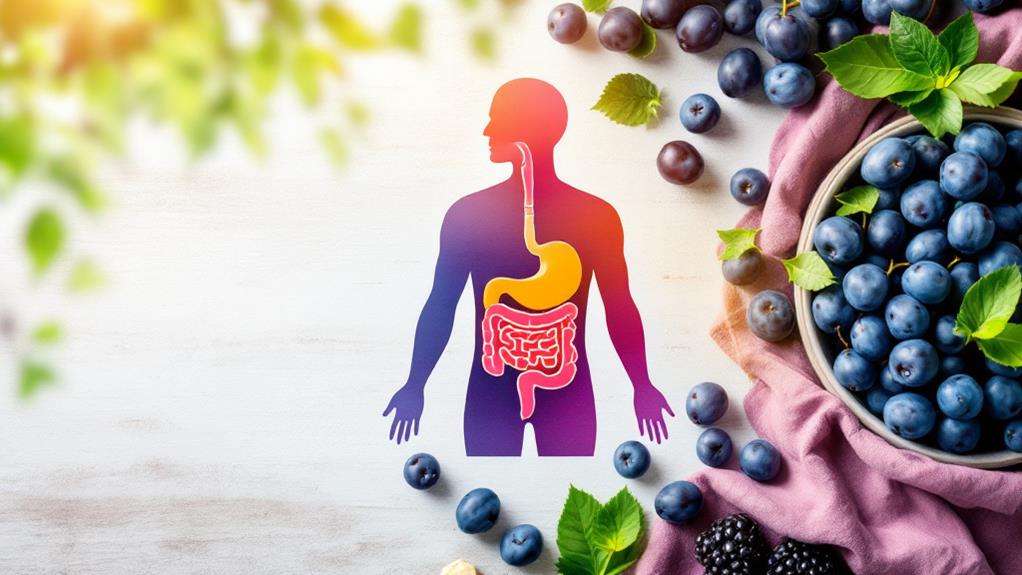
Have you ever considered the wide array of supplementary health benefits prunes offer beyond easing constipation? They're packed with antioxidants, which help combat oxidative stress and lower your risk of chronic diseases. But that's just the beginning. Prunes are also loaded with dietary fiber, which is significant for maintaining good gut health. This fiber not only aids digestion but may also positively alter your gut microbiome, promoting a healthier digestive system.
Prunes provide important nutrients like iron and manganese, both critical for energy production and bone health. Plus, they're a good source of potassium—276 mg per 100 g serving—which supports muscle function and cardiovascular health. The vitamins A, C, and K in prunes contribute to a range of bodily functions, including immune support, skin health, and blood clotting. Here are some of the ways prunes can benefit your health:
- Antioxidants: Combat oxidative stress and reduce chronic disease risk.
- Dietary Fiber: Supports digestion and gut health.
- Important Nutrients: Iron and manganese for energy and bone health.
- Potassium: Supports muscle and cardiovascular health.
- Vitamins A, C, and K: Improve immune function, skin health, and blood clotting.
Incorporating prunes into your diet can be a simple, tasty way to enhance your general health.


